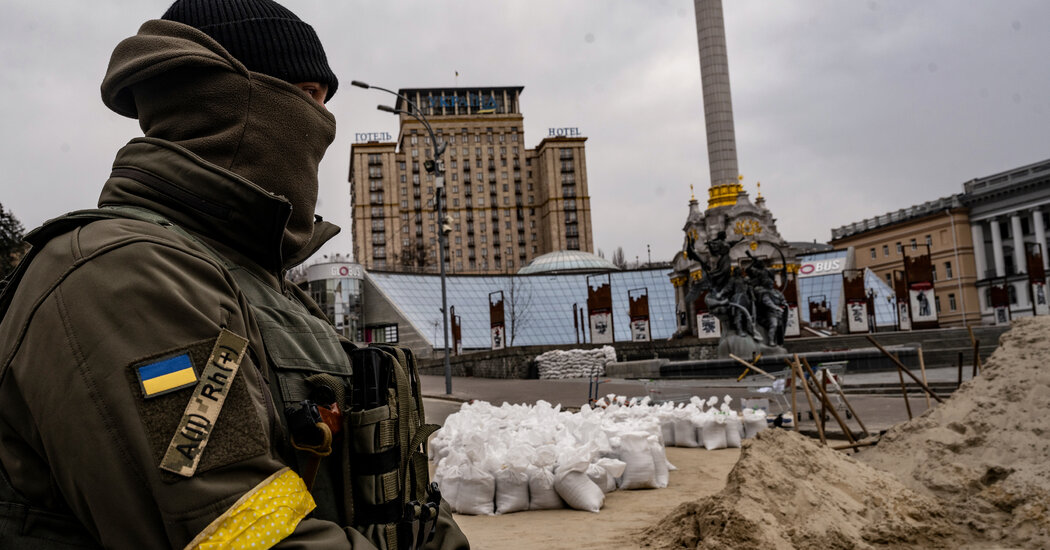Just as Europe was emerging from a downturn caused by the Omicron variant of the coronavirus, Russia’s war on Ukraine has sent energy prices soaring and shattered forecasts of the region’s economic health.
Policymakers are grappling with how to curb inflation without taking the economic recovery off course.
The war “will have a material impact on economic activity and inflation, through higher energy and commodity prices, the disruption of international trade and weaker confidence,” European Central Bank president Christine Lagarde told reporters on Thursday.
“The risks to the economic outlook have increased significantly,” she continued, adding that the bank wanted to keep all options available for how to proceed.
But in the face of rising inflation, which is nearly triple the central bank’s target of 2 percent, policymakers on Thursday confirmed their plans to end the euro 1.85 trillion bond-buying program by the end of this month ( $2.05 trillion) from the pandemic era. It also announced that it would seek to end its legacy bond-buying efforts and overall lower purchases in the third quarter if the inflation outlook doesn’t worsen. According to an earlier schedule, the older program had no proposed end date.
Last month, annual inflation in the eurozone rose to 5.8 percent, from 5.1 percent a month earlier. On Thursday, the central bank raised its inflation forecast for the next three years, forecasting annual inflation for 2022 to be 5.1 percent, nearly double its forecast of 2.6 percent three months ago. Inflation is expected to reach 2.1 percent in 2023, just above the central bank’s target, and 1.9 percent in 2024.
While higher-than-expected inflation increased pressure on the central bank to end its bond-buying programs and raise interest rates, the war is also weighing on the economy as higher energy costs make it more difficult for companies to pay bills and damage consumer confidence.
“The outlook for the economy will depend on the course of the war between Russia and Ukraine and on the impact of economic and financial sanctions,” said Ms Lagarde, who described the conflict as “a turning point for Europe”.
Due to the war, the central bank lowered its forecast for economic growth this year from 4.2 percent to 3.7 percent. The bank has factored in other outcomes in its economic forecasts, including a heavier drag on trade and consumer confidence as a result of the war, but in all its forecasts inflation has been around the 2 percent target by 2024.
On Wednesday, Italy’s statistical office estimated that the sharp rise in energy prices could reduce the country’s economic growth by 0.7 percentage points this year. On Thursday, Goldman Sachs analysts presented a bleak forecast for growth in the euro-zone. They said the region’s economy is expected to grow by 2.5 percent this year, down from the 3.9 percent previously forecast.
“We recognize that there is huge uncertainty and that things could go either way, and we want to be able to respond to those circumstances,” said Ms Lagarde.
The bank kept interest rates unchanged, noting that any rate changes would occur “sometime after” the end of net asset purchase program purchases and would be gradual. In its statement, the bank dropped the previous language that said rates could be lower.
According to the bond buying schedule presented Thursday, the bank will buy bonds worth €40 billion in April, €30 billion in May and €20 billion in June. After that, purchases would be “data dependent” – in other words, dependent on economic conditions – but the bank would aim to end them by October, which some analysts have interpreted as a sign that rates will be lower by the end of the year. can still be increased. year.
Unlike the Bank of England, which has already started raising interest rates, and the Federal Reserve, which plans to raise interest rates soon to combat inflation, the European Central Bank is slowing down as inflation it’s trying to tackle primarily stems from energy prices, an imported cost over which the bank has little control.
The calculations have taken into account a “significant” increase in energy prices. Russia’s invasion has already pushed gas and oil to exorbitant prices amid concerns over supplies from Russia and decisions by the United States and Britain to stop importing Russian oil.
On Tuesday, the European Commission announced a plan to make the region independent from Russian oil and gas by the end of the decade, with proposals to install equipment needed to generate large amounts of clean energy, such as wind and solar. energy to accelerate. Last year, more than a third of the European Union’s natural gas came from Russia.
Some analysts said reports that the European Commission is considering a major spending package to fund defense and energy spending should support the economy and keep the European Central Bank on track.
“As fiscal policy works to cushion the shock of higher energy prices, the ECB has no reason to deviate from the process of monetary policy normalization it initiated in December,” wrote Sylvain Broyer, an economist at S&P Global Ratings, in a note earlier. the policy announcement.


